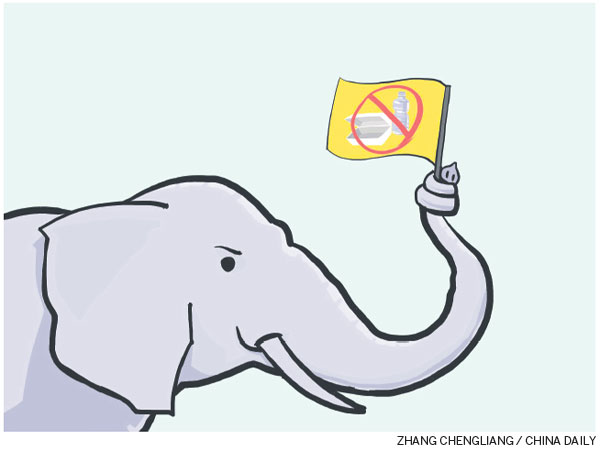Bag crackdown is an example to follow

Kenya must learn lessons from other countries, including China, if it is to successfully tackle the menace of plastic pollution
Kenya must adopt lessons learned from China and countries around the world to ensure it delivers on its promise to reduce the use of plastics.
East Africa's largest economy announced in mid-March that it would ban the use, manufacture and importation of all plastic bags used for commercial and household packaging.
The landmark move-the third attempt in a decade-saw it join major developed countries in the war on plastic.

But as it attempts to reduce the environmental scourge, experts say Kenya must borrow lessons learned around the world to make the ban a success.
Plastic bags were commonly found in water-ways, on beaches and in other unofficial dumping sites across China. The nuisance caused by them was referred to as "white pollution".
The State Council, China's Canbinet, responded in January 2008 by prohibiting shops, supermarkets and sales outlets from providing free plastic bags less than 0.025 millimeters thick.
The State Administration for Industry and Commerce also threatened to fine shopkeepers and vendors as much as 10,000 yuan ($1,465) if they were caught distributing free bags.
In its first review of the ban, the National Development and Reform Commission announced that supermarkets had reduced the use of bags by 66 percent barely a year later after the policy came into force.
The legislation had saved China 1.6 million tons of petroleum used in bag production, the NDRC estimated just a year after the ban's implementation.
Before the ban, an estimated 3 billion plastic bags were used daily across China, creating more than 3 million metric tons of garbage each year, according to official estimates.
China consumed an estimated 5 million metric tons (37 million barrels) of crude oil annually to produce plastics for packaging, estimates further show.
But how did China achieve success in implementing the ban?
According to a study titled The Effects of an Environmental Policy on Consumers-Lessons from the Chinese Plastic Bag Regulation, published by the University of Gothenburg and Beijing Normal University, enforcement was key. The commerce administration enforced the ban through a 600,000-strong army of regulators who inspected some 250,000 retail stores and markets.
The key feature of China's regulation was that free provision of plastic bags was prohibited in all supermarkets, stores and all other retailers across the country (excluding bags used for separating foods and other products for hygiene and safety).
Shops were also instructed to mark the price of bags clearly and not to attach the cost to that of other items.
The study says governments must win the support of citizens to make such policies successful.
According to its findings, people's attitudes toward the policy played a significant role in reducing the number of bags used after the regulations were implemented.
Since plastic bags are still easily affordable, the study says, it is important to strengthen and maintain people's supportive attitudes toward the regulation in order to further reduce bag use.
Previous efforts by Kenya to implement such a law have failed, and it remains to be seen if the latest ban on bags-which can take years to decompose-will bear fruit.
Environment and Natural Resources Cabinet Secretary Judi Wakhungu announced the new regulation on March 15.
"It is notified to the public that the cabinet secretary for environment and natural resources has, with effect from 6 months from the date of this notice, banned the use, manufacture and importation of all plastic bags used for commercial and household packaging," Wakhungu said in a gazette notice dated February 28.
Manufacturers and importers are required to stop providing plastic, single-use carrier bags to customers by Aug 28.
Furthermore, all manufacturers and importers must declare all their remaining stocks to the National Environment Management Authority by the due date.
To support the ban, Kenya's Treasury has allocated Ksh 3.8 billion ($36.7 million) for environment management and protection.
Presenting the country's 2017-18 budget on March 30, Treasury Secretary Henry Rotich said that, through the ban, the government aims to fight pollution and preserve the environment.
However, the move has not gone down well in some quarters. The Kenya Association of Manufacturers has condemned the ban as "illegal and rushed".
KAMChief Executive Phyllis Wakiaga claims the move will hurt 176 plastic manufacturing companies and affect more than 60,000 employees.
Shoppers are also in the dark about how they will carry their shopping goods.
"I don't know whether we will be forced to carry our own bags. There is a lot of uncertainty in how we will be shopping after the ban," says Fiona Wangui, a shopper in Nairobi's central business district.
But supermarkets have expressed willingness to cooperate.
"We support the efforts to have a clean environment. We will have to look for an alternative," says Willy Kimani, chief operating officer of Naivas supermarket.
Previous efforts by Kenya to abolish the use of plastic bags have failed and it remains to be seen if the latest ban will bear fruit.
In January 2011, Kenya declared a ban on bags below 0.6 millimeters in thickness but the move was ineffective.
In 2007, there was a ban on bags below 0.3 millimeters in thickness, which also failed.
Among countries and regions that have taken action against the use of plastic bags are China, Bangladesh, the US State of California, Denmark, Hong Kong, Ireland, South Africa, Rwanda, Tanzania and the United Kingdom.
Some 100 million bags are handed out every year in Kenya by supermarkets alone, the United Nations Environment Programme estimates.
They are a major cause of environmental damage and health problems.
They not only kill animals that mistake them for food, but they also damage agricultural land, pollute tourist sites and provide breeding grounds for the mosquitoes that carry malaria and dengue fever.
They also contribute to the 8 million metric tons of plastic waste that leaks into the ocean every year.
The author, a freelancer journalist based in Nairobi, focus on environmental policy. The views do not necessarily reflect those of China Daily.
(China Daily Africa Weekly 04/28/2017 page10)
Today's Top News
- China warns about Japan's intended military buildup
- China urges EU to halt anti-subsidy probes
- Experts: Lai not freedom fighter, but a pawn of the West
- Hainan evolves as gateway to global markets
- Opening up a new bridge between China and world
- Tour gives China-Arab strategic trust a boost






























